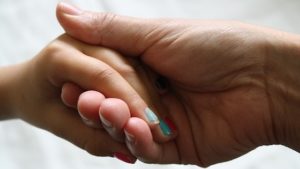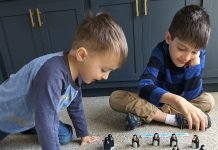 This last year was pretty hectic. I started a new job, we moved to the Kansas City area, my fiancée moved in with us, my kids started in a new school for the first time, and my 10-year-old son was diagnosed with autism. That was definitely a lot to take in.
This last year was pretty hectic. I started a new job, we moved to the Kansas City area, my fiancée moved in with us, my kids started in a new school for the first time, and my 10-year-old son was diagnosed with autism. That was definitely a lot to take in.
New things to learn, new ways to react, new ways to teach, new ways to approach a stressful topic. It was a bumpy journey but one we navigated as a family. However, with most of the attention being focused on my son, his six-year-old sister began feeling left out.
I have strived to be one of those moms that treats her kids as equally as possible. Having a boy and a girl 4 years apart was actually pretty easy to do; it also helped that they were at different developmental stages and had different interests. Everything obviously wasn’t 100% equal, but I made sure they both were loved, rewarded, and admonished the same. I work to lay out the praise and punishment as fairly as possible. But with the sudden shift of attention turning toward my son and his diagnosis, my daughter felt the need to reclaim some of her missing focus.
She initially started this journey through regression. She would baby-talk, whine more often, and even wet the bed a couple of times. Sensing this for what it was, a cry for attention, I did my best to double down my efforts for her. I didn’t quite reach my mark.
There was too much going on, other things I had to take care of, appointments that needed to be made, and discussions that needed to be had. As things began to calm down, as we started to get a good handle on how to deal with our new truth, my daughter had found her own means at being seen and heard. She had begun lying.
Nothing big at first, nothing that was so noticeable that she would get called out immediately. No, she didn’t know how the whole roll of toilet paper got into the trash can. She wasn’t the one that shut the cat out. She wasn’t sure if she could remember exactly how food made it into her bedroom.
Never anything that would get her into serious trouble had she simply told the truth. We tried explaining the importance of truth to her, and she seemed to accept it. Next, she started saying things just for attention. “Mom, I don’t know if I should love you or my dad more.” Definitely an attention getter. I would sit her down and have a whole conversation with her about how she shouldn’t worry about who to love more because she had enough love for everyone and we all loved her very much. I was tackling what she was saying, but not why she was saying it.
Then the bigger lies started. She would come home from school with incredible stories that couldn’t possibly be true. She would tell us how her teacher made her and the other girls in class have a “who’s prettier contest,” a friend of hers slapped her so hard at recess that the girl was immediately expelled and never seen again. We even got a concerned call from her teacher one day, apparently my daughter had told the teacher that her father was mean to her and her brother, and she was afraid of him.
My fiancée and I brainstormed ways to deal with this. She was very good about owning up to lying once confronted about it, but that didn’t seem to deter it from happening again. Aside from going over how important it was to tell the truth, we explained to her how bad it could be if someone believed one of her lies. We started making her donate her stuffies when caught in a lie. She didn’t whine or fuss about the punishment, she didn’t try to make deals or beg, she instead accepted it with tearful resolve. I had at least taught her that actions have consequences, but what really worked was something I tried on a whim.
I caught her lying to me again about something and instead of simply telling her to stop lying and explain again that it was wrong, I sat next to her and made her give me some good eye contact. I reached over and took her hand in mine and gently said, “I know that’s not true. Now tell me a truth.”
Not knowing what to expect I was surprised when she said, “My favorite color is really purple.” (She had been telling me for weeks that her favorite color was blue, like me). Then she burst into tears. As I held her, the force of her crying was shocking to me. That’s when I realized that she missed our connection. She missed the small conversations we would have about ourselves to each other, the times I would brush her hair for fun, when we’d make beaded bracelets together, when we’d color together. I realized I had pushed all of that aside as I began to cry myself.
It’s been about six months since then, with continued effort and a reorganizing of priorities I am fairly certain we have found a good balance. My son is doing great and aside from the diagnosis, he is still himself. He doesn’t need any extra attention other than our awareness of his autism. He’s never been high maintenance, thank goodness.
Every day, I make time for both of my children as needed. Some days my son needs more of my time while my daughter is content to play alone with her dolls. Other days my son wants to simply play on his DS and ignore the world around him and my daughter and I discuss the many complexities of life. And almost every day, my daughter and I talk about how excited we are for her to grow up so we can be best friends.
















